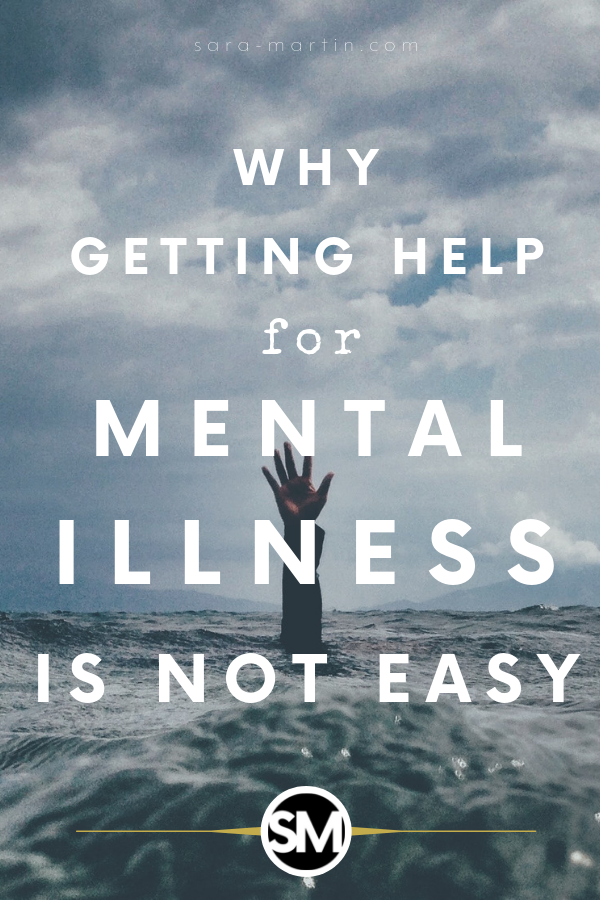Today I met with a new therapist. I say this with no shame because mental illness has been part of my story long enough that it’s not something I feel the need to hide anymore. Still, taking that first step of getting help is never easy, regardless of how many times I’ve taken it before.
Putting lack of accessibility to services and affordability aside, there are actually a lot of reasons seeking treatment for mental illness is so difficult. The reality is, one in five adults in the U.S. lives with a mental illness, but less than half of them receive treatment.
What’s stopping us from getting help?
Stigma around mental health is still strong.
It’s true: there’s something about the idea of invisible problems existing only in one’s mind that seems to lessen the seriousness we give to mental conditions. In a “what doesn’t kill you makes you stronger” kind of culture, we tell each other to just get over it. Just be happy. Just pray more. But if these “solutions” truly worked, wouldn’t we be seeing suicide rates decreasing rather than continuing to climb?
How many more news reports will it take of people ending their lives to convince the world that mental illnesses are actually real problems?
Part of the stigma problem is a lack of understanding. Just as I have no idea what it’s like to live with type one diabetes, neither can someone really know what it’s like to live with a mental illness if they’ve never had one. This in itself can breed judgment against mental conditions and feed stigma. Even the most well-intentioned individuals can discourage or shame a person for struggling mentally if there is no bank of personal experience to help them relate. But where personal experience may lack, empathy and compassion do a great job of bridging gaps.
If not weakened, stigma will only keep stifling sufferers from getting the help we need.
My brain needs help, but it fights against itself.
The most complex organ in the human body, the brain is just as susceptible to problems as other organs are (if not more so). The mind, beautiful as it is, is capable of becoming a very dark and destructive place. However, unlike other parts of the body that use physical pain to signal to us that something is wrong, the pain produced by many mental illnesses is not so easily recognized. In fact, we may not even realize it is pain at all, but think it’s just the way life is supposed to feel.
If your perception tells you everything is normal, why would you doubt it?
When I was experiencing major depression following my graduation from college, I happened across a TED Talk by Andrew Solomon on the topic of depression. One quote from his talk has stuck with me, and I believe it describes well what having a mental illness can feel like.
“You don’t think in depression that you’ve put on a gray veil and are seeing the world through the haze of a bad mood. You think the veil has been taken away, the veil of happiness, and that now you’re seeing truly… it’s difficult with depressives, because we believe we are seeing the truth.”
For many, mental illness is the lens of truth through which we see the world. My depressed brain can tell me, “You’re unworthy of getting help” or “There’s no hope of things getting better,” and without counseling or medication to help me think otherwise, I’m likely to believe those negative thoughts and NOT get help.
When you’re your own worst enemy and forced to literally fight against yourself, getting treatment can feel futile.
Not all mental health professionals are equal.
Finding the right treatment provider can be daunting. Just type “counselor” into Google Maps, and you’ll likely get a long list of everything remotely related to psychology within a certain radius. Depending on what specific issue you’re looking for help with, it can be hard to find the right person with the right qualifications. Not to mention trying to decipher what all the PsyD, PhD, and LLPC credentials mean, and if they matter.
A fun fact about mental health professionals: like any other human, they have personalities and quirks that might not mesh with you. I had a counselor before that I really liked, and another I just didn’t click with. It can be discouraging, devastatingly so if you have a debilitating mental condition, to invest precious time and money into finding professional help only for it to not work out, or worse, end up causing more harm than good.
Even if you find a qualified mental healthcare provider, it can take weeks or months to get an appointment depending on a number of uncontrollable factors. With an illness like depression though, sometimes you don’t have weeks or months to spare waiting around — not when your ability to function daily depends on it.
Finding and getting help from a professional is crucial, but it’s not always easy.
Taking psychotropic medication has specific challenges.
If you have a headache, you can take a painkiller. If you have heartburn, you can take an antacid. Generally, we can cure mild physical discomfort in a relatively short period of time simply by ingesting a capsule. This learned expectation that popping a pill will make us feel better, however, doesn’t exactly hold up when applied to medications prescribed for mental health conditions. The times I’ve expected medications for my brain to work like any other pill only resulted in frustration and discouragement.
Psychotropic medications are a breed of their own. It’s a given that many drugs have side effects, and psychotropic meds are no exception. But due to their nature, side effects of these drugs can be really noticeable and rather unpleasant. Even if you successfully start a new medication and are able to manage the side effects that come with it, it generally takes weeks to feel the full effect with no sure guarantee the drug will actually help.
Meds can be a godsend for individuals with mental disorders given the right amount of patience and endurance. Unfortunately, without ample supply of both, it can be hard to not want to give up.
These are just a few of the reasons that have held me back from getting help for my own mental illness. It’s easy to tell people to get help, but we have to realize the very process of getting help can seem entirely overwhelming to someone who’s already struggling on a deep level.
I believe some of the strongest individuals on the planet are those who fight every day for their mental wellness. It takes incredible courage and strength even just to breathe when you live each day in the dark shadow of a hurting mind.
So be a friend to us. Support us with compassion. And let us lean on your strength so that the possibility of getting better seems a little less arduous and a little more attainable.

